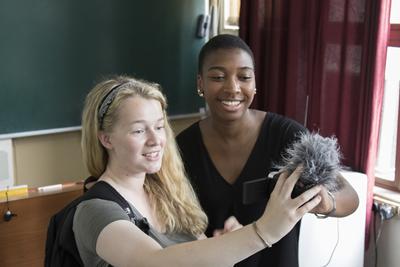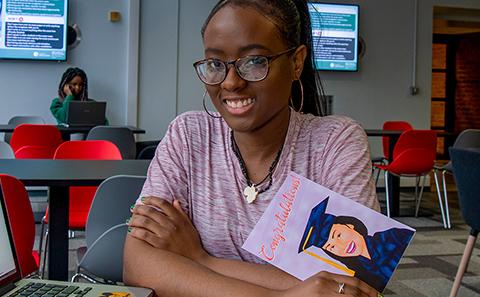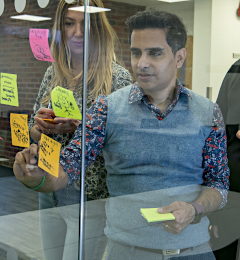Nurturing tomorrow’s global leaders
Our Social Impact Lab enables students to change the world for the better
Southampton Spotlight shines a light on the impact our University is having across the world through the achievements of the individuals that make up our community.
Dr Pathik Pathak, Director of the Social Impact Lab, is driving change to enable students to use their knowledge and skills to tackle the world’s most pressing issues. He has pioneered the use of challenge-based education, a holistic approach that brings people from across disciplines together to work on real-world challenges.
Driving change
Pathik and his team at the Social Impact Lab are inspiring the next generation of leaders to focus on the global issues that have the largest impact, rather than the largest financial gain.
They enable students to use the knowledge and skills gained through their course to address the pressing social challenges of the 17 UN Sustainable Development Goals, which include ending poverty and hunger, improving mental health and taking action on climate change.
Open to all Southampton students, the Lab runs in parallel with degree courses and is a way for students to become part of a wider community with a common ambition.
“Multidisciplinary working is at the heart of our approach,” says Pathik.
The social innovation happens when we get the engineering, computer science, history, English language, sociology, management and maths students working together to understand the root causes of problems.
Dr Pathik Pathak introduces the Social Impact Lab

Although many universities have social enterprise funding, the Social Impact Lab is unique in tailoring support to each student’s needs, interests and values to match them with the right pathway to impact.
The Lab also has a successful international fellowship, Spark India, which fuses four-week internships with personal development workshops and site visits to social enterprises, charities in India and cultural trips. Last year the project was held virtually, but this year it is returning in-country.
There is a big emphasis on self-reflection and skills development, which is crucial, says Pathik:
“The whole purpose of higher education is cultivating leaders, and you don't do that unless you're working through experience. And you can't understand your development unless you take time to sit back, to pause, to reflect on what you've learned, and then apply that.”
Pathik also plans to scale Spark India into a Year in Social Impact, giving students the opportunity to spend a dedicated period of time working with one of the Social Impact Lab's Indian partners.
Broadening horizons
Pathik has set up a University-wide Social Enterprise module to give students the skills and know-how to design solutions to social problems, as well as gaining broad transferable skills, such as group project work and working with external stakeholders. There are internship opportunities with a range of partner non-government organisations (NGO) and social enterprises, both in the UK and India.
Over the past year, the Social Impact Lab has established a social enterprise called Home/grown SO14, with the ambition of making Southampton a global pioneer in the use of creative, data-powered neighbourhood participation to transform spaces, lives, and livelihoods. Home/grown SO14 is a co-produced research, knowledge exchange and enterprise project involving researchers from four faculties, a number of local community groups and the Solent NHS Trust.
“What I find exciting about this is that it’s a co-produced social impact project, with our students working with residents in the community to make changes that will make a difference to people’s lives,” says Pathik.
Mission-based education
Pathik believes that higher education could do more to develop future leaders who are equipped to change the world for the better.
His vision is for students to come to university not to do a degree, but to complete a mission – such as tackle food poverty, climate change or gender equality – and take different modules and activities that boost their understanding of that issue.
My dream is that through the Social Impact Lab we can help to cultivate a mission-driven sense of student experience – and as well as provide an inspiring experience for students, drive real-world change.
Find out more on the Social Impact Lab website and Facebook page, or sign up to the newsletter. Follow Dr Pathik Pathak on Twitter @pathik10
Related Staff Member
You may also be interested in:

Leading the way to affordable green energy
Entrepreneurial engineer develops tech to combat fuel poverty.

Calculating the climate cost
Researchers analyse the carbon footprint of cryptocurrencies

Overcoming stereotypes and changing perceptions
Enterprising Law student shines light on underrepresented communities
